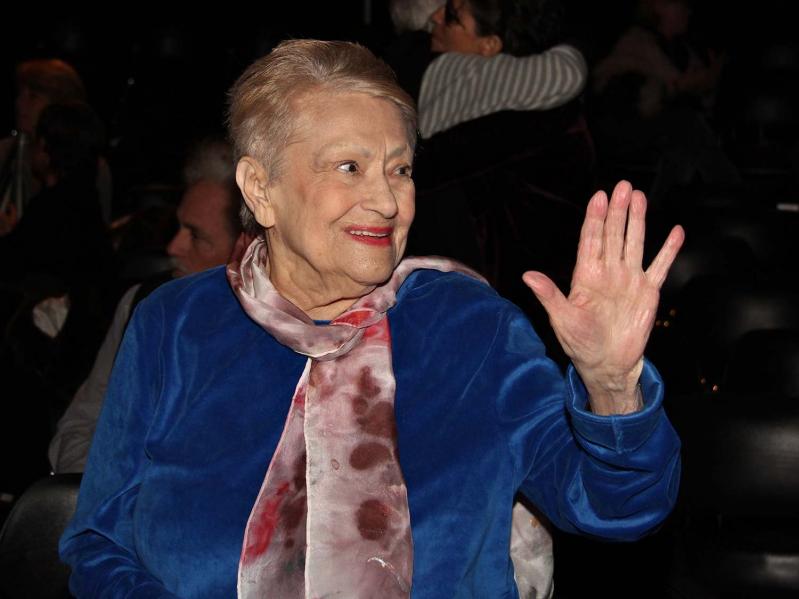“I always dreamt to be an actress,” says Judy Sleed of East Hampton in the opening moments of the film “I Am Judit” — not a romance, not a comedy, not a mystery, but a documentary.
One about her own life.
Produced by Christiane Arbesu, the film, released in 2023, represents the first time Ms. Sleed, a Holocaust survivor, had told her story to a public audience. In fact, the filming of “I Am Judit” was the first time her own children heard, from start to finish, what their mother had been through, having known before only what others had told them when they were children.
Ms. Sleed, a playwright, children’s book author, and television host who described herself as an “independent broadcast media professional,” died at home here on June 14, of sepsis from liver failure, at the age of 92. Although she was in her nineties and had survived a heart attack in May, her death was unexpected, said her daughter, Jodie Sleed of Woodstock, N.Y. “Even though she was 92, she was young at heart,” Jodie Sleed said.
A friend once described her mother as having been “born with stardust,” her daughter recalled. “That’s a good way to describe her, because she had a lot of talents,” she said.
But she certainly wasn’t born a star. Judit Zsuzsanna Weinberger was born in Budapest on April 30, 1932, to Pál Peter Weinberger and the former Margit Goldstein. She had an older brother, Tomi, and her early years were happy, she said in “I Am Judit.” There was music — Judit took piano lessons, Tomi played the violin, and the family listened to Hungarian tunes together.
All changed when she was 12. On Oct. 20, 1944, her father and brother were taken away by the Nazis, and her mother three days later. Left on her own, she somehow managed to survive by hiding in a house that had been damaged by bombs. She was the only member of the family to have survived, and her before-and-after story can be found in the archives of the Holocaust Memorial Museum in Washington, D.C.
When the war in Europe ended six months later, she fled Hungary, first to Italy, living for a time in Rome and Naples. On Oct. 29, 1947, she was admitted to the United States, having been granted “lawful entry for permanent residency” (though her papers weren’t officially stamped until Dec. 5, 1960). She gave her name as Judith Weinberger and settled in Brooklyn.
About seven years later, she met Joel Sleed. They married in February 1955 and would have three children together, raising them in Baldwin, where they often entertained friends to dinner. Her husband was a travel writer, and the couple visited many places where his job took them. The marriage ended in divorce, and Mr. Sleed died in 2014.
As the years went on, Judy Sleed began writing. She composed an autobiographical play titled “Delibab-Utca,” the name of the street where the house she’d hidden in was located. She wrote a comedic play called “Oh, Gregory” and a musical called “Georgie Day.” Her self-published children’s book, “The Fight of the Crayons,” can be found on Amazon. She was an avid reader as well, her daughter said — shelves of books, including titles by James Patterson, Dick Francis, and Eli Wallach, can be seen in the documentary — and she also loved puzzles, old movies, and chocolate-covered almonds. She also adored her daughter's rescue dog, Ginger.
Judy Sleed spent the last 23 years of her life in East Hampton. Michael Clark, the executive director of LTV Studios, where she hosted a talk show called “The Play Is the Thing,” was the one who introduced her to Ms. Arbesu, the filmmaker, who would ultimately help her tell her story.
In a eulogy given last Thursday at a screening of “I Am Judit” at LTV, Ms. Arbesu described Ms. Sleed as someone who “handled her losses with grace, tenderness, and compassion, not anger. Ever.”
“She was always looking for someone to be on her show,” Ms. Arbesu recalled. “She was curious and really wanted to get to know you . . . [she] really lived, in spite of all of her deep losses. She treasured life and people. Her smile was infectious. Judy was familiar — I felt like I knew her forever, from the second I walked into her home.”
That Judy Sleed had waited so long to speak about her past eventually became a point of conflict in the family. “She didn’t want to talk about it . . . because it was too painful for her,” her daughter said. “I was not allowed in to that part of my mother’s life.”
In the film, Ms. Sleed acknowledges that “it was a mistake” not to tell her children sooner. “I thought I was preventing them from sadness or cruelty,” she says.
The film features two of her children, Jodie Sleed and Jeff Sleed. Their sister, Jill Sleed, died in 2016. Her son has since died as well.
“In hindsight,” said her daughter, “she was my lifeline, and was always there for me. She lived for her children — that is something she always said. She lived for her children.”
Judy Sleed eventually understood that telling her story more widely could have an impact, especially given the resurgence in this country, over the last several years, of antisemitic crimes. To an audience of East Hampton High School students this past February, she said: “I’m very happy to share, so the younger generation wouldn’t say that it never happened . . . I just hope you don’t have to experience anything like I went through.” In 2019, Suffolk County recognized her contributions to East Hampton Town’s interfaith and anti-bias task force with a proclamation in her honor.
She returned to Budapest just once, in 2003, with her daughter.
In addition to Jodie Sleed and her longtime partner, Robert Frazza, Judy Sleed leaves a former son-in-law, Ron Parenti of Rosendale, N.Y. Four grandchildren also survive. They are Nate Parenti of Queens and his wife, Jillian Vicinanza; Matt Parenti of Saugerties, N.Y., and his wife, Stacey Shultis; Jordan Sleed of San Antonio, Tex., and his wife, Jennifer; and McCartney Sleed of Austin, Tex. Two great-grandchildren, Arya Parenti and Ryder Parenti, survive as well. Ms. Sleed died with a third on the way.
She also leaves a dear friend, Miriam Meller of Israel. They had been close since the age of 15, keeping in touch even during challenging circumstances. Ms. Meller’s son, Shmulik, told Jodie Sleed that her mother and his were “like sisters,” sharing “many years of a bond that was forged during unbearably difficult times.” Ms. Sleed also leaves her aide, Nataliya Tarashchuk, who was "loving, thoughtful, and very attentive," her family said, and a close-knit circle of friends that continued to grow in recent years.
Judy Sleed was buried on June 17 at Shaaray Pardes Accabonac Grove Cemetery in Springs, Rabbi/Cantor Debra Stein of the Jewish Center of the Hamptons and Rabbi Leibl Baumgarten of Chabad of the Hamptons officiating at the graveside service.
Her daughter has suggested memorial donations to causes that were close to her heart: the Ellen Hermanson Foundation, Chabad of the Hamptons, the Jewish Center of the Hamptons, and LTV Studios, or to any Holocaust memorial organization of the donor’s choice.




